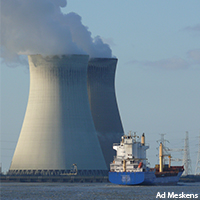
Editor's note: Climate and energy scientists James Hansen, Ken Caldeira, Kerry Emanuel and Tom Wigley released an open letter Sunday calling on world leaders to support development of safer nuclear power systems.
(CNN) -- To those influencing environmental policy but opposed to nuclear power:
As climate and energy scientists concerned with global climate change, we are writing to urge you to advocate the development and deployment of safer nuclear energy systems. We appreciate your organization's concern about global warming, and your advocacy of renewable energy. But continued opposition to nuclear power threatens humanity's ability to avoid dangerous climate change.
We call on your organization to support the development and deployment of safer nuclear power systems as a practical means of addressing the climate change problem. Global demand for energy is growing rapidly and must continue to grow to provide the needs of developing economies. At the same time, the need to sharply reduce greenhouse gas emissions is becoming ever clearer. We can only increase energy supply while simultaneously reducing greenhouse gas emissions if new power plants turn away from using the atmosphere as a waste dump.
Renewables like wind and solar and biomass will certainly play roles in a future energy economy, but those energy sources cannot scale up fast enough to deliver cheap and reliable power at the scale the global economy requires. While it may be theoretically possible to stabilize the climate without nuclear power, in the real world there is no credible path to climate stabilization that does not include a substantial role for nuclear power.
We understand that today's nuclear plants are far from perfect. Fortunately, passive safety systems and other advances can make new plants much safer. And modern nuclear technology can reduce proliferation risks and solve the waste disposal problem by burning current waste and using fuel more efficiently. Innovation and economies of scale can make new power plants even cheaper than existing plants. Regardless of these advantages, nuclear needs to be encouraged based on its societal benefits.
Quantitative analyses show that the risks associated with the expanded use of nuclear energy are orders of magnitude smaller than the risks associated with fossil fuels. No energy system is without downsides. We ask only that energy system decisions be based on facts, and not on emotions and biases that do not apply to 21st century nuclear technology.
While there will be no single technological silver bullet, the time has come for those who take the threat of global warming seriously to embrace the development and deployment of safer nuclear power systems as one among several technologies that will be essential to any credible effort to develop an energy system that does not rely on using the atmosphere as a waste dump.
With the planet warming and carbon dioxide emissions rising faster than ever, we cannot afford to turn away from any technology that has the potential to displace a large fraction of our carbon emissions. Much has changed since the 1970s. The time has come for a fresh approach to nuclear power in the 21st century.
We ask you and your organization to demonstrate its real concern about risks from climate damage by calling for the development and deployment of advanced nuclear energy.
Sincerely,
Dr. Ken Caldeira, Senior Scientist, Department of Global Ecology, Carnegie Institution
Dr. Kerry Emanuel, Atmospheric Scientist, Massachusetts Institute of Technology
Dr. James Hansen, Climate Scientist, Columbia University Earth Institute
Dr. Tom Wigley, Climate Scientist, University of Adelaide and the National Center for Atmospheric Research

